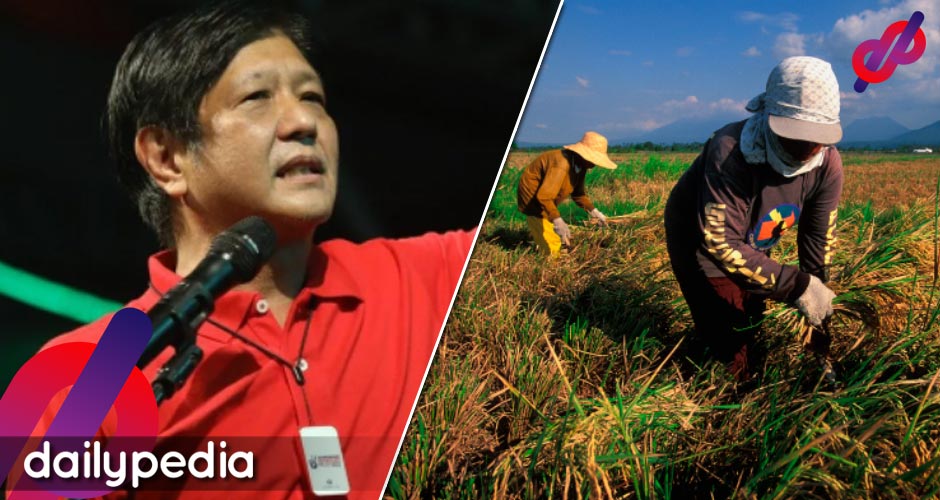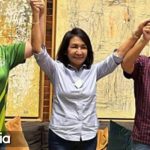In a radio interview in November 2021 in Tacloban City, Presidential aspirant Ferdinand ‘Bongbong’ Marcos Jr. mentioned that the country’s agriculture system must be enhanced to ensure the welfare of farmers who have been heavily impacted by the COVID-19 pandemic.

Marcos explained that bringing back an agricultural system that was established before is essential for rebuilding the agricultural system and will alleviate the lives of farmers.
“Malaking sistema ang agrikultura at kailangan nating buuin ulit ”yan para maging mas maganda ang buhay ng ating mga magsasaka. Ang tulong na mabibigay ng gobyerno ay ang magbuo ng sistema ‘gaya ng meron tayo noon, (Agriculture is a huge structure that we have to rebuild to make life better for our farmers. The government can help by building a system similar to what we had in the past),” Marcos explained.
What he was trying to refer to is the establishment of the International Rice Research Institute (IRRI) in the 1960s. The IRRI paved the way to introduce improvements in the agriculture sector.
He then recalled the Masagana 99. The Masagana 99 was established by the dictator, Marcos in 1973. It was to help farmers through subsidies of technology packages of high-yielding rice varieties and low-cost pesticides and fertilizers. The objective was to solve the rice shortage crisis creating the Kadiwa retail. It is a systematic program that benefited the farmers and the consumers and was initiated by Imelda Marcos.
It is important to note that in 2011, the Philippine court ordered Imelda Marcos to return nearly $280,000 in state funds stolen by her late husband and dictator Marcos nearly three decades ago.
Mrs. Marcos was given 30 days by the anti-graft Sandiganbayan court to return the stolen money. Should she fail to do so, the properties of Marcoses will be seized to cover the amount.
“The court issued the writ of execution and the count will begin from Friday last week, the date when the court sheriff received the order,” the court spokeswoman said.
The siphoned funds from the National Food Authority (NFA) which is the government’s rice importing agency funded the stolen money to be returned which was transferred to a private bank account in 1983.
In a ‘Deep Probe’ segment of SMNI on March 26, 2022, at Okada, Manila, Marcos Jr. shared his plans.
The host asked him about his opinion on the declining age of farmers and the number of young individuals engaging in agriculture which the host termed a ‘shortage of farmers.’
Marcos Jr. said how farmers encourage their sons to study instead of venturing into farming since farming is a tough livelihood.
“Oh regarding the age of farmers getting older not only are they discouraged to co min their parents who are farmers they say “wag na kayong pumasok dito napaka hirap ng buhay dito mag aral kayo pumunta kayo sa Manila pumunta kayo sa city jan kayo magpagaling hindi niyo na kailangan daanan itong dinadaanan namin” that’s the state of agriculture of Philippines today,” Marcos explained.
“Going back to the issue of the age of our farmers and the young people who are not going into agriculture uh if it is an agribusiness if it is not the traditional farming method that we are always going throught that we’ve been doing for the last millenium. But going into something that is more hightech then that will necessarily ask need for uh the entry into more technically minded uh agribusiness practitioners and that will bring the age younger immediately,” he explained emphasizing on technnology.
“I still think We can improve attractiveness of agriculture to younger people if we use the most modern and the most interesting technology…” he continued.
As the interview continued, Marcos Jr. was asked about the role of government in agriculture.
Marcos emphasizes on mechanization of the Philippine agriculture system through the use of large tractors and big machines.
“It’s going to take not the simple thing because we have to organize now large to be able to mechanize properly to use the big machines to use the big tractors yung nakikita natin sa ibang bansa na kalaki-laki. Ang bilis-bilis sa isang araw ang ilang-ilang ektarya nakokover nila o ang avergae na land holding dito sa Pilipinas is less than one hectare so hindi mo magamit yung ganong mga klaseng makina si the way to do it or the way we did it is we organized the cooperatives and that way we were able to take full advantage of the economies scale and I think that’s what we need to do here in the Philippines,” he explained.


